Overview and Methods
The Creative Independent is a resource of emotional and practical guidance for artists of all types. Our aim is to publish insights and wisdom that make it easier to sustain a fulfilling creative life. Throughout our work, we’ve seen how hard it can be to build such a life in the music industry—from how difficult it is for aspiring musicians to break through, to how even the most seasoned, respected musicians struggle to support themselves. But what, exactly, is bringing down the music industry—and what can be done to improve things?
In October of 2019, The Creative Independent's Willa Köerner and creator of the Future Music Industry list, musician René Kladzyk, co-authored two future-focused surveys—one for musicians, and one for industry professionals. By surveying the music community at large, we hoped to get a clearer sense of where things currently stand, in addition to identifying clear takeaways for how the industry can be improved.
After collecting nearly 300 survey responses, we’ve analyzed the information and distilled it into 10 key findings, which we are presenting here. Alongside each key takeaway you’ll find a snapshot of the supporting data, plus write-in quotes from survey respondents.
As a companion piece to this report, today we’re also publishing a guide written by René, called How to build the future music industry we want and need. While this report shares key findings from the surveys, René’s guide contextualizes the findings from her perspective, and offers additional thoughts on how each and every participant in the industry can come together to collectively build what’s next.
Despite the somewhat stark nature of this report, we’re optimistic about where things can go if we all work together to create the change we want and need. We hope you are, too.
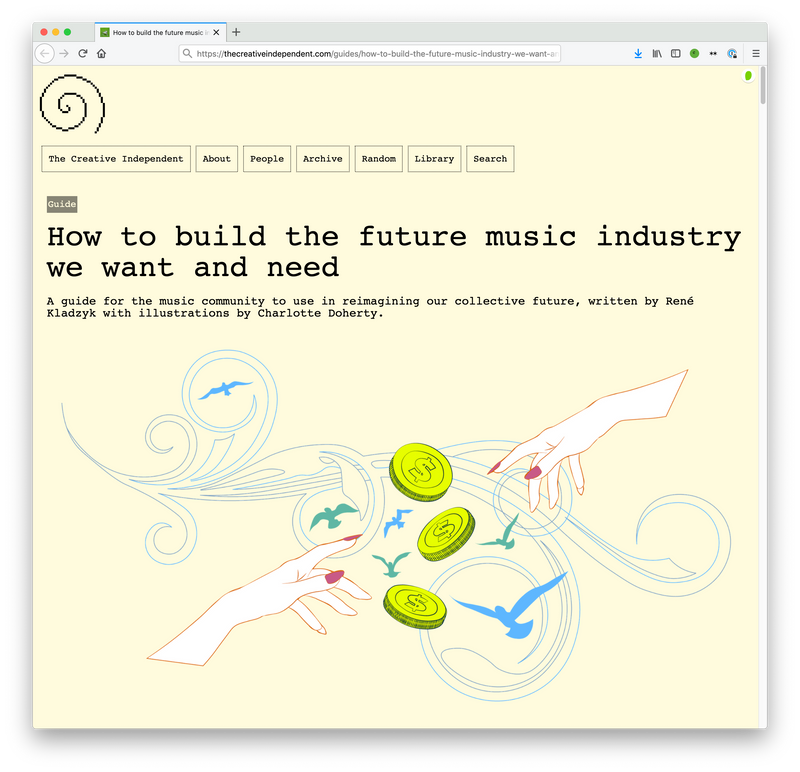
Read the companion piece to this report:
A guide to building the future music industry we want and need
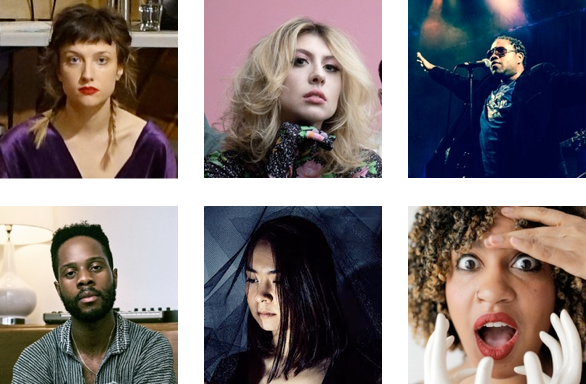
Explore additional pieces from our Music Industry Investigation series
Who Participated In This Study?
For additional data, expand the charts on the right-hand side of this report by clicking on them.
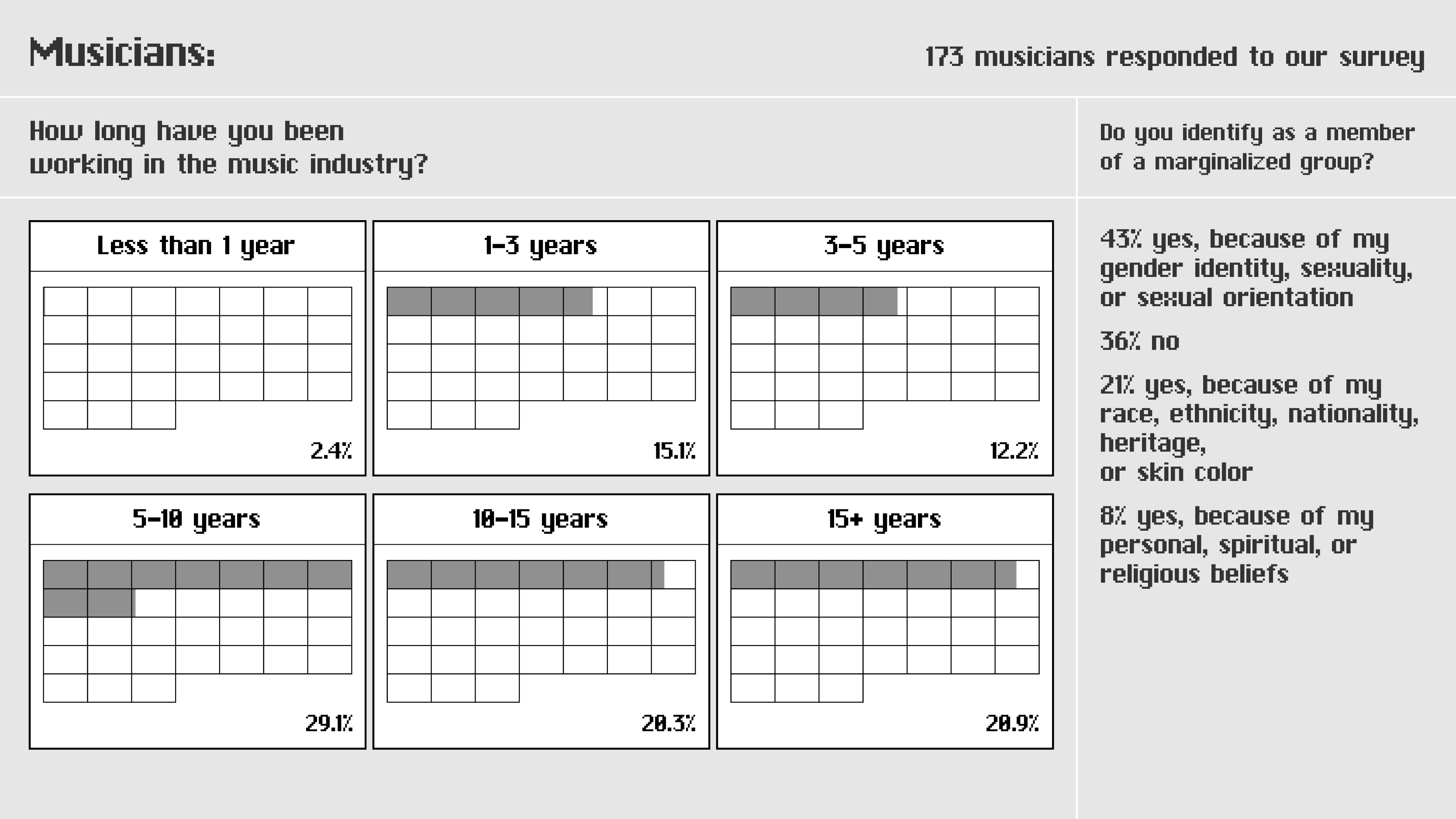
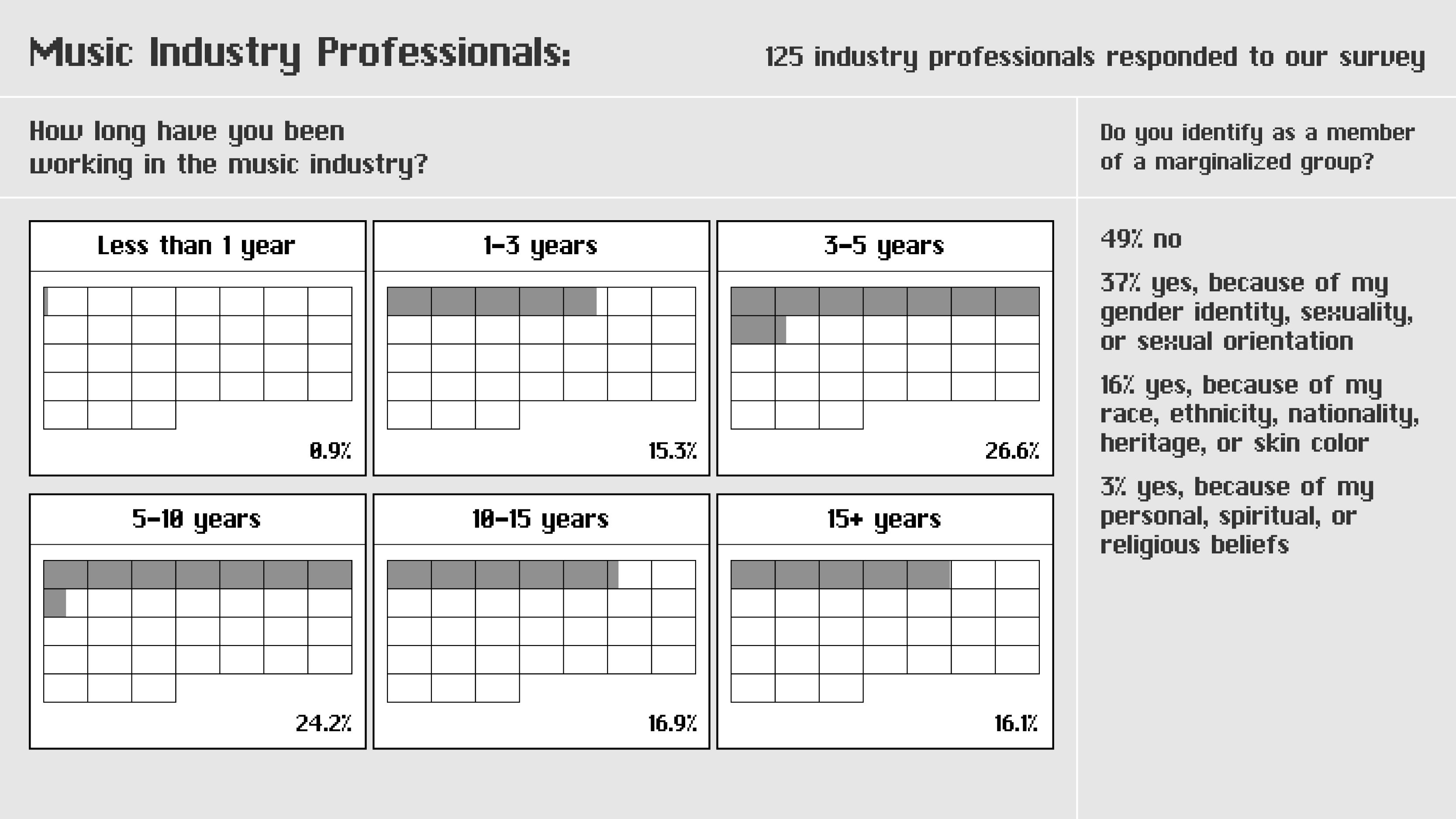
Overall, 298 musicians and music industry professionals shared insights through our surveys.
There was a broad range of experience reflected, with over 41% of musicians and 33% of industry professionals having spent more than 10 years working in the industry. Participating industry professionals primarily reported working for record labels, as bookers or promoters, in music press or PR, and in artist services. 23% of industry professionals reported that they were also musicians, reflecting the crossover between performers and other industry roles.
Survey respondents largely came from TCI’s readership and René’s Future Music Industry list contacts, and the broader circles of those who shared it from this initial pool. In order to ensure the privacy of participants, we did not collect any personally identifiable information (including gender, race, or income levels), and therefore cannot provide specific respondent demographic information. While we can’t say that these survey results accurately reflect the music industry as a whole, we believe they provide a snapshot of the current state of the industry, and shed light on many of the most pressing challenges that must be addressed.
Survey Key Findings
Key finding 01: The vast majority of musicians cannot earn a living wage through music-related work.
Overall, what percentage of your annual income comes from music-related work (such as performance fees, album/merch sales, teaching, composing, etc)?
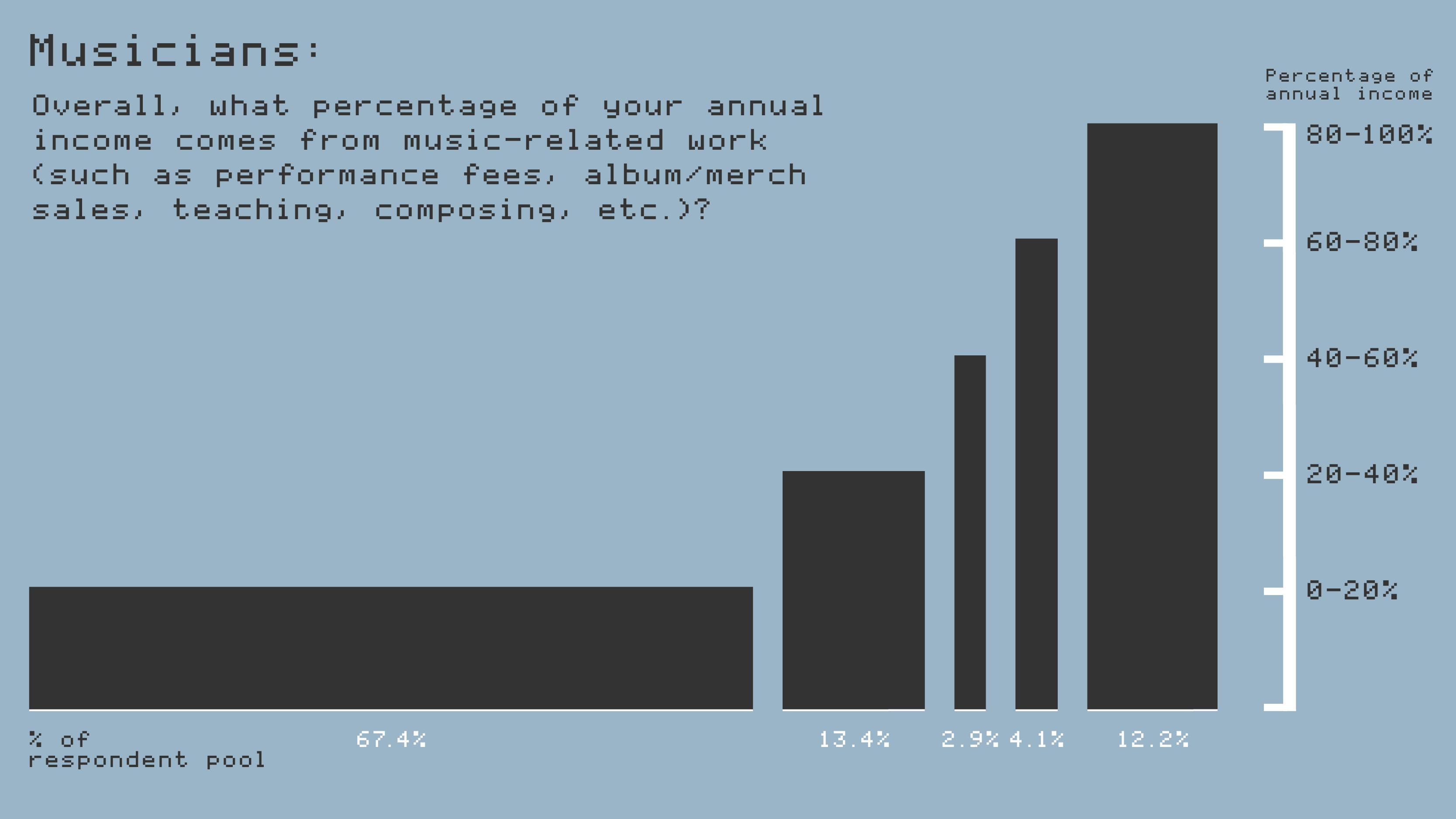
How have you primarily been able to make money through your music? (Choose up to 3)
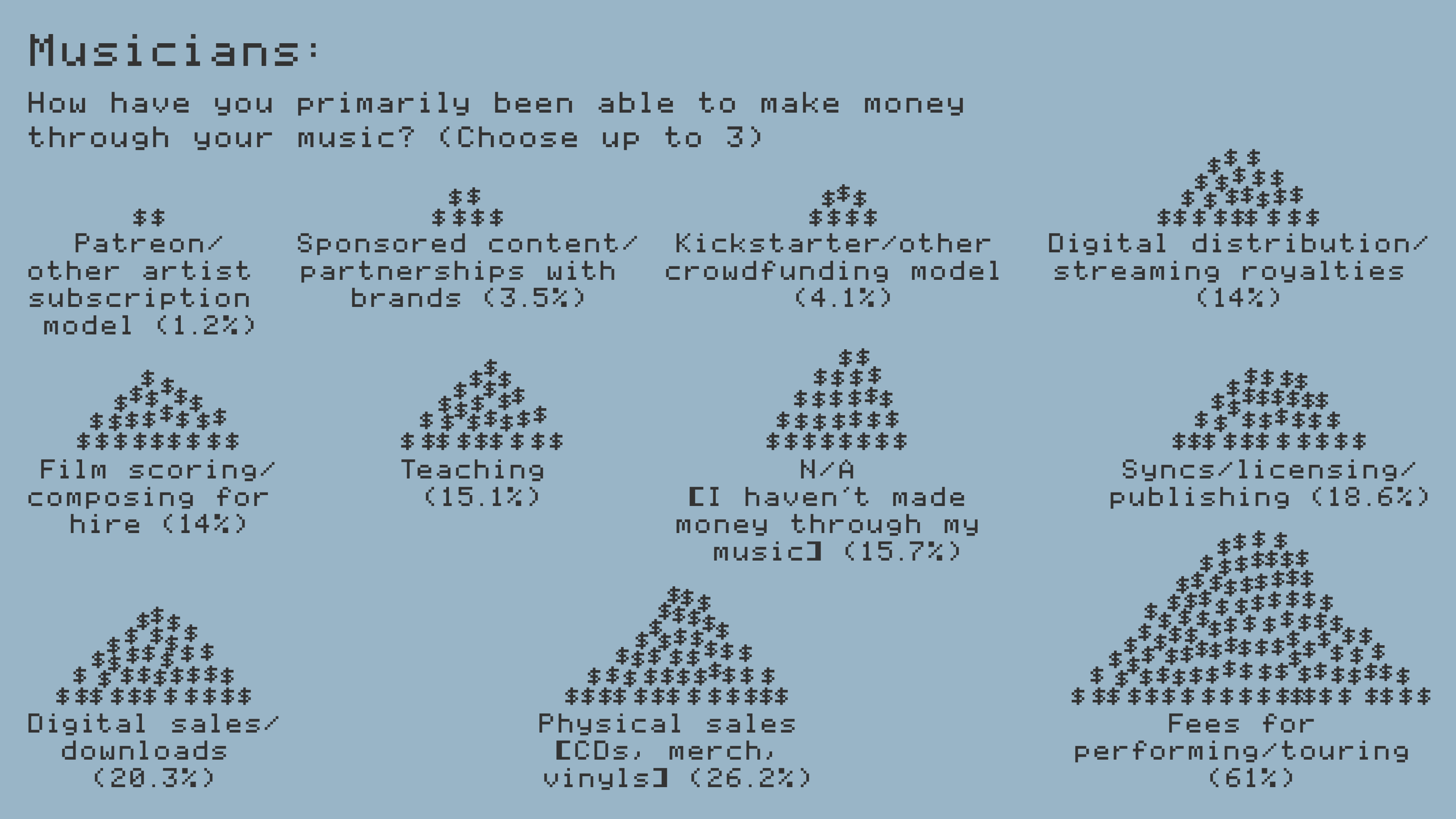
In an era where musicians are primarily earning music-related income through performance fees, it’s clear that most are unable to support themselves by touring alone. And, while industry professionals see opportunities for musicians to make money through publishing and branded content, musicians do not appear to be reaping the benefits of those income generators.
Data Snapshot:
- Over two thirds of musicians reported that music-related earnings accounted for 0% – 20% of their income. This is among an experienced group of participants: 70% of musicians had been working in the music industry for over 5 years, and 41% for over 10 years.
- Just 12% of musicians reported that 80% – 100% of their income came from music-related work.
- When asked about the ways they’d primarily been able to make money through their music, “performing/touring” was by far musicians’ top choice.
- Musicians and industry professionals disagreed about how musicians can best earn money: When asked about the most lucrative ways for a musician to generate music-related income, the greatest percentage (66%) of industry professionals thought that syncs, licensing, and publishing were lucrative methods to generate income, and 55% thought one of the top ways would be through sponsored or branded content. However, only 19% of musicians reported that syncs, licensing, or publishing was one of the primary ways they’d been able to make money, and just 4% reported that branded or sponsored content was a primary money-earner.
Respondent Insight:
“I can only see true, concrete change happening if payment opportunities—be that through digital streaming, live shows, merch manufacturers, etc—meet in the middle to create a sustainable environment for creatives to live and work within.”
Key finding 02: The music industry is much more accessible to those with financial privilege.
Musicians:
What have been your greatest challenges in pursuing a rewarding and sustainable career in the music industry?
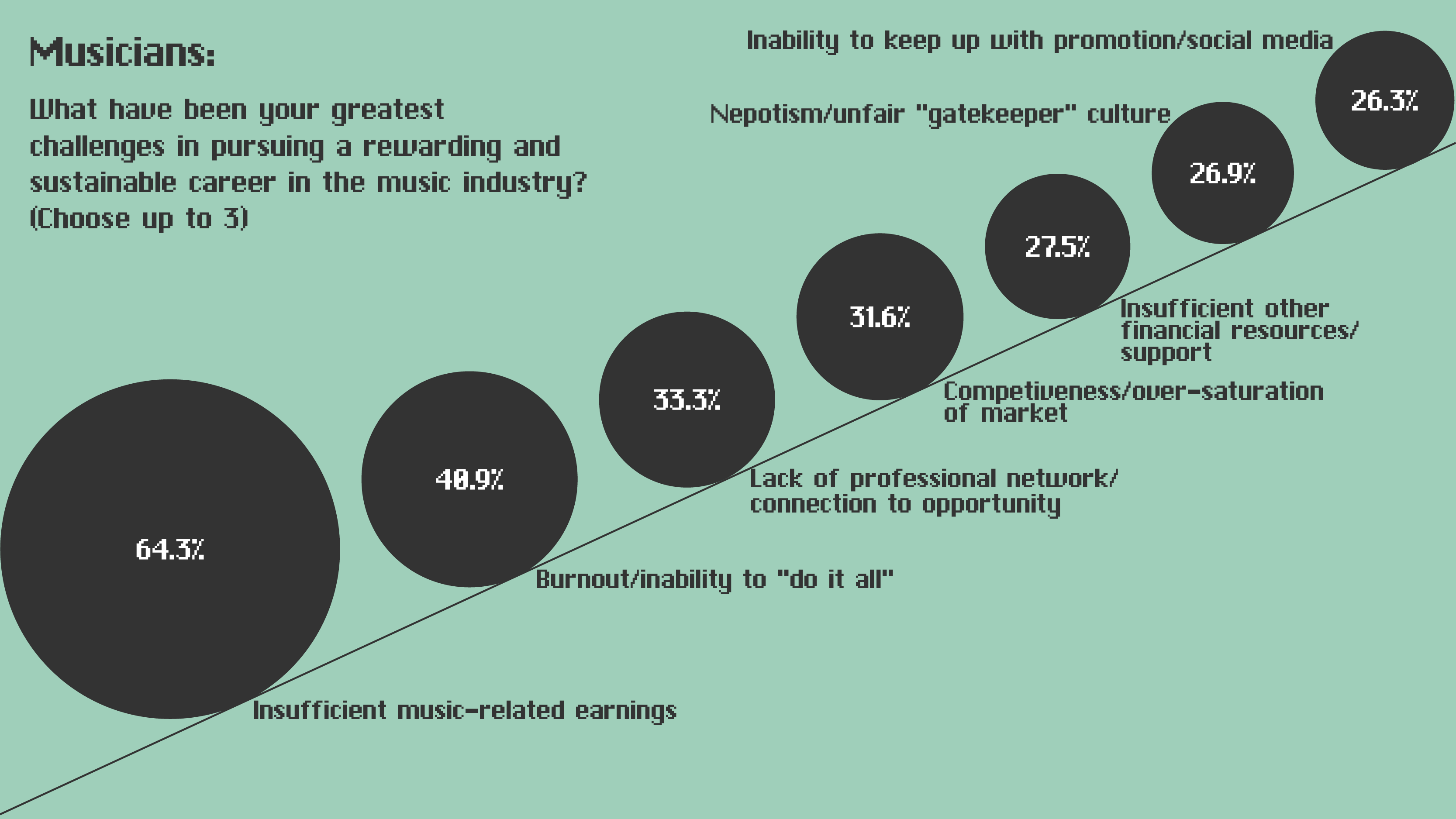
Industry Professionals:
What have been your greatest challenges in pursuing a rewarding and sustainable career in the music industry?
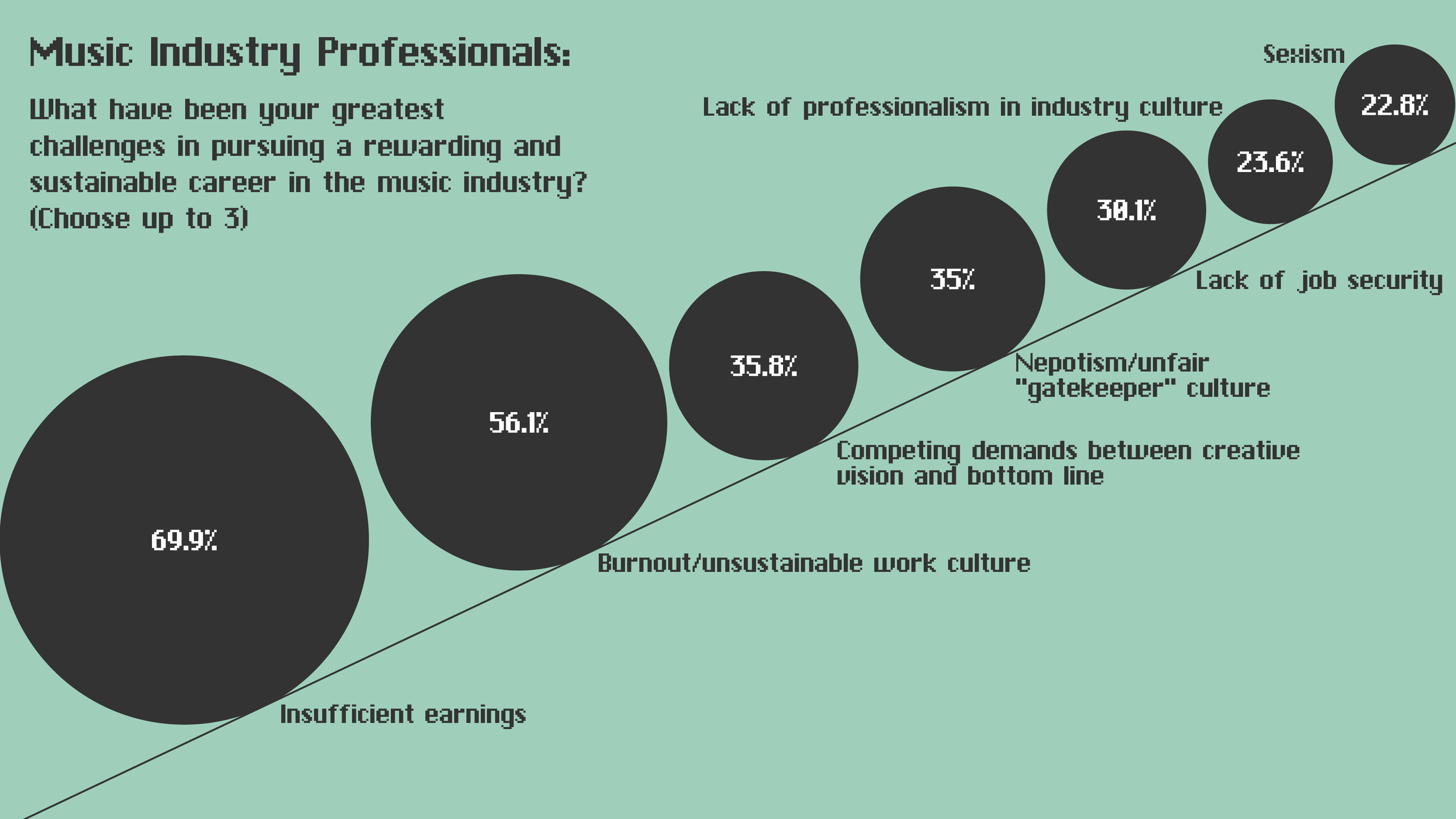
Since the vast majority of musicians cannot earn a living wage through music-related work, those without financial privilege are left without a way to sustain their participation. Similarly, music industry professionals suffer from insufficient earnings. Despite this dire funding landscape, many still continue to pursue a career in the music industry.
Data Snapshot:
- 64% of musicians and 70% of industry professionals reported that one of the top reasons it was hard for them to pursue a career in the music industry was “insufficient earnings.”
- Just 17% of musicians and 33% of industry professionals reported that they were “always able to pay their bills each month.”
- 37% of musicians reported that they were barely able to pay their bills, or actively in debt.
Respondent Insights:
“I really feel like in the next 10 years every person making indie music will be forced into day jobs/a million side hustles.”
“So much of who gets to have a say in the industry is defined by who gets to go to good colleges, who gets to live in NYC or LA, and who gets to afford unpaid internships. Most of these qualifications are directly affected by class, as well as race and gender. These are immense issues which need to be tackled by the industry as a whole.”
Key finding 03: Most musicians see themselves as unsuccessful.
Musicians
How “successful” do you currently feel in the music industry?
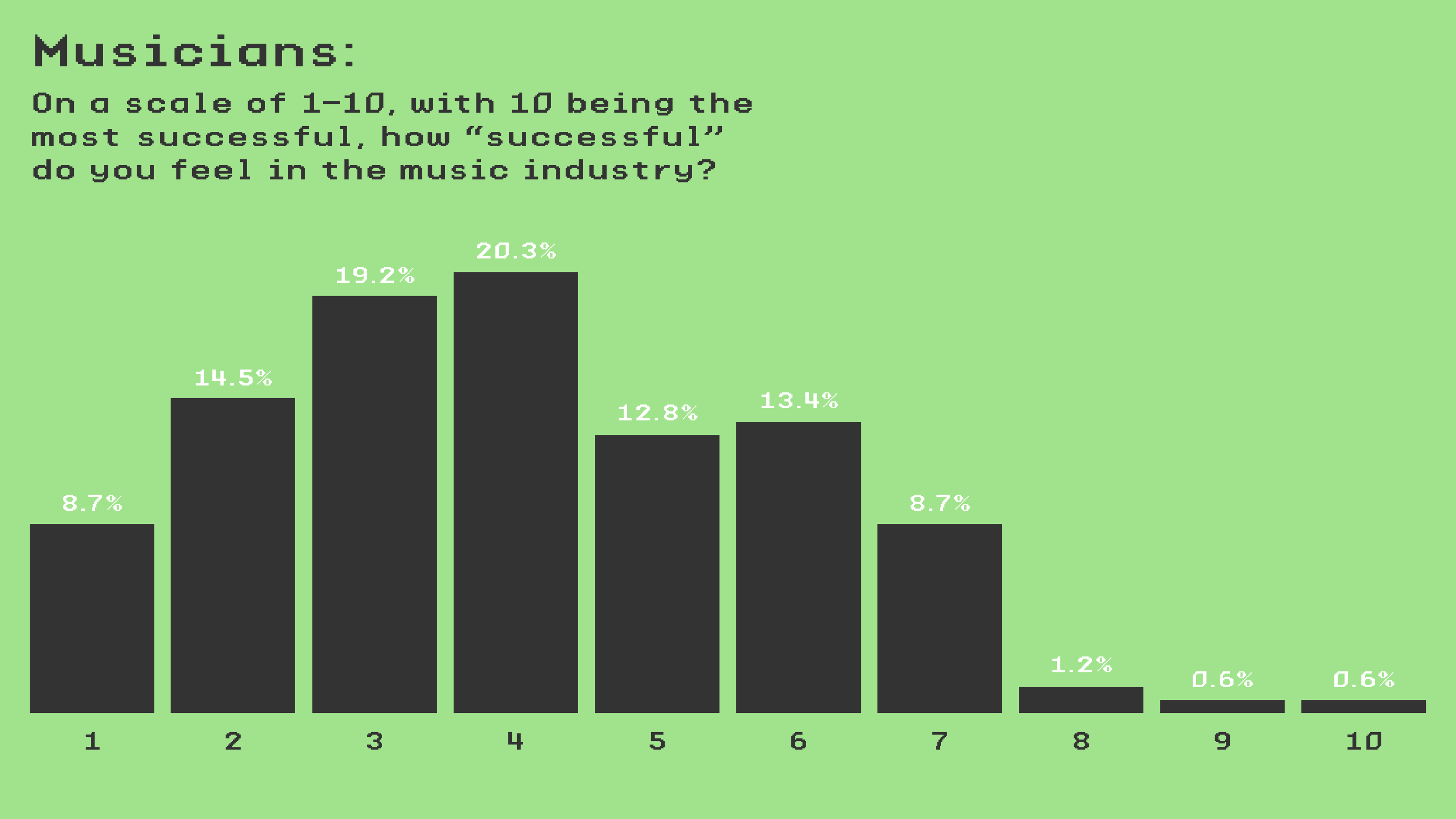
Musicians
Personally, what do you see as the most important overall thing to achieve as a musician, out of the list below?
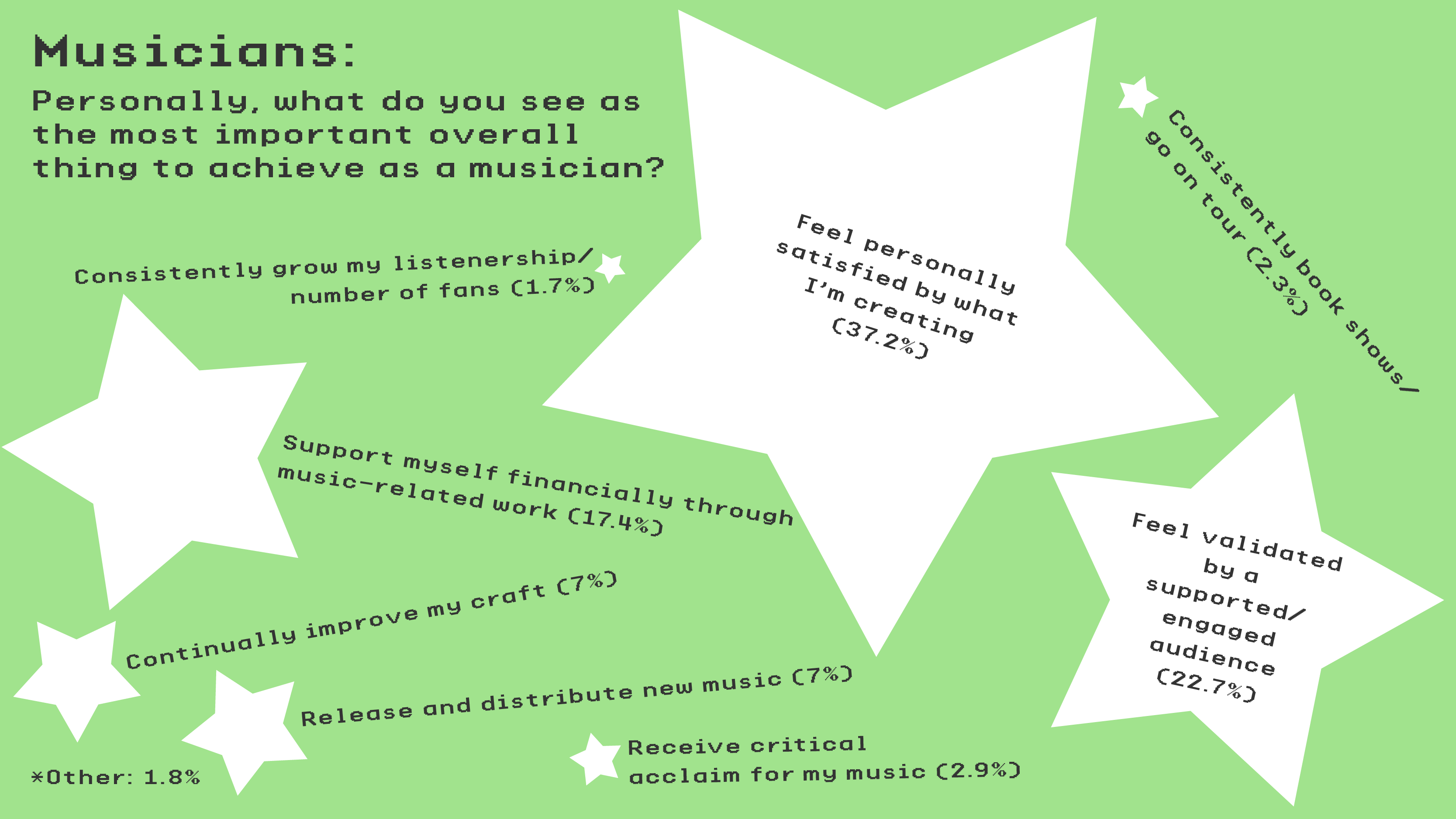
Despite the fact that the largest number of musicians chose to define “success” by their ability to derive personal satisfaction from their work, most still view themselves as unsuccessful. Significant numbers of musicians also reported that no sector of the music industry had helped them in advancing their career, indicating a feeling of alienation and overall lack of support in the industry.
Data Snapshot:
- When asked to rate how “successful” they felt on a scale of 1-10, the highest percentage (20%) rated themselves a 4. When asked the same question, industry professionals tended to rate themselves higher (between 5 and 7).
- When asked what they considered the most important thing to achieve as a musician, the highest percentage (37%) responded that they wanted to “feel personally satisfied.” The second highest percentage (23%) wanted to “feel supported by an audience,” and the third highest percentage (17%) wanted to “support themselves financially” through their music.
- 21% of musicians reported that no sector of the music industry had been helpful to them.
Respondent Insights:
“Reverse the incessant funnelling of all money and work in the industry towards the goal of fame and popularity. There are opportunities on the fringes, and that’s where the interesting art is happening, but the industry is only geared up to fund and promote the most straight-down-the-line easy music.”
“I don't feel ‘successful’ because I can barely afford to be alive.”
Key finding 04: There is an urgent need for digital streaming services to reform their models.
Musicians
Which sector of the music industry has the greatest opportunity to make specific changes to how they operate that would improve the status quo of the industry as a whole?
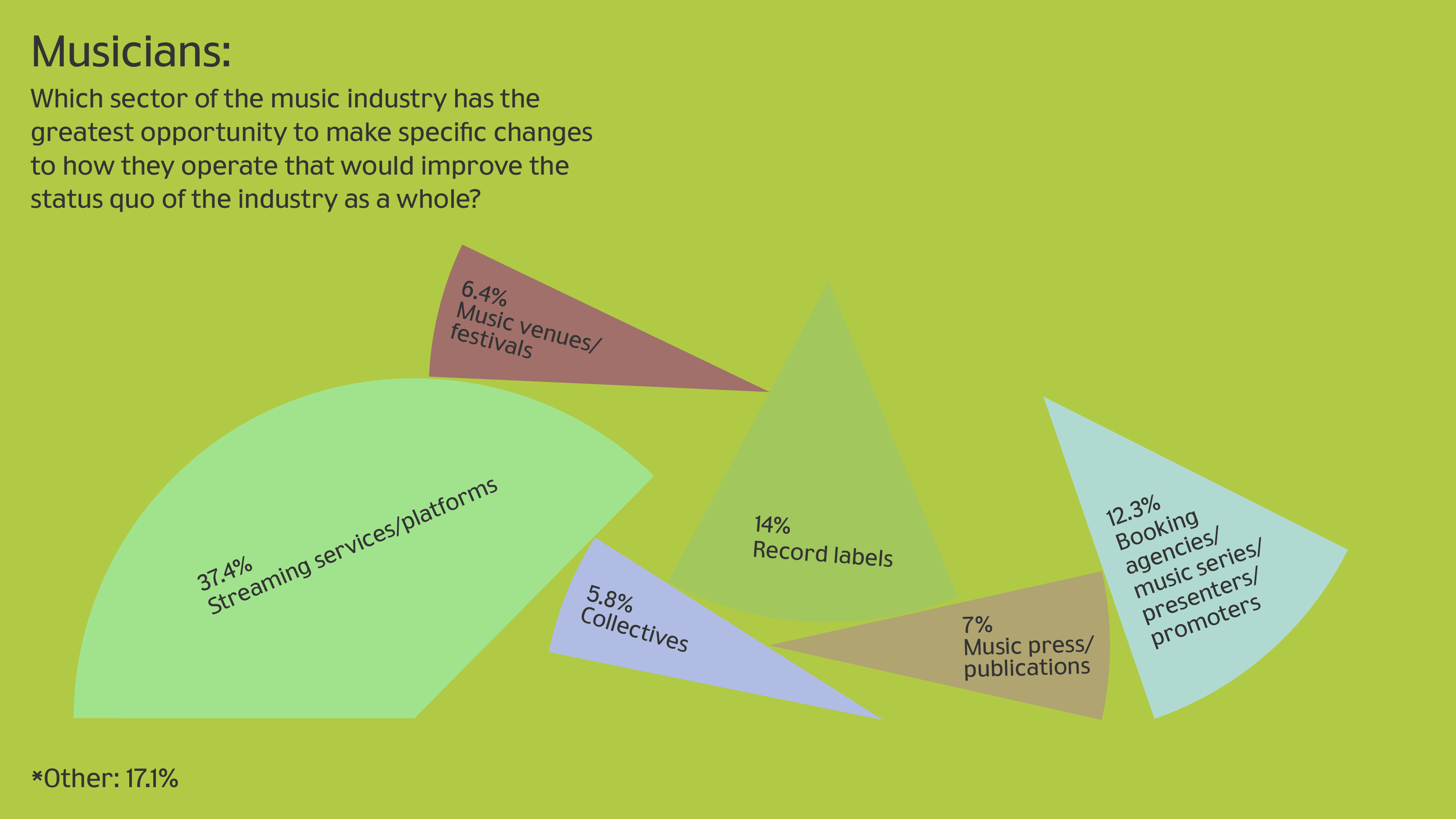
Across the board, the music community asserts that the unfairness inherent in streaming services’ payment models and content curation perpetuates unfairness overall, and creates a negative ripple effect across the entire industry. Many respondents suggested that putting collective pressure on services such as Spotify to pay artists fairly, and investing in more cooperative models for distributing music, would help.
Data Snapshot:
- When asked which sector(s) of the music industry most need to change, by far the largest percentage of industry professionals (61%) singled out streaming platforms.
- 22% of musicians believe that lack of diversity in algorithmically curated content is one of the top barriers keeping the music industry from being more inclusive.
Respondent Insights:
“I perceive the rapid power that streaming giants have gained as unregulated—a monopoly in the industry. Spotify should be regulated like radio is.”
“The percentage of income paid to Spotify’s top-level corporate employees far outweighs what the actual creators of the content are paid. Financial support to artists through subscriber fees could create a more valued system for both the creator and subscribers.”
“Streaming services could be designed in a way that values creative labor more highly, encourages album listening, algorithmically counters racism and sexism instead of reinforcing it, and encourages listeners to buy music and attend upcoming concerts.”
Key finding 05: The music community calls for more diversity in live show bookings.
Industry Professionals
What is your most frequent method of directly spending money on music/musicians?
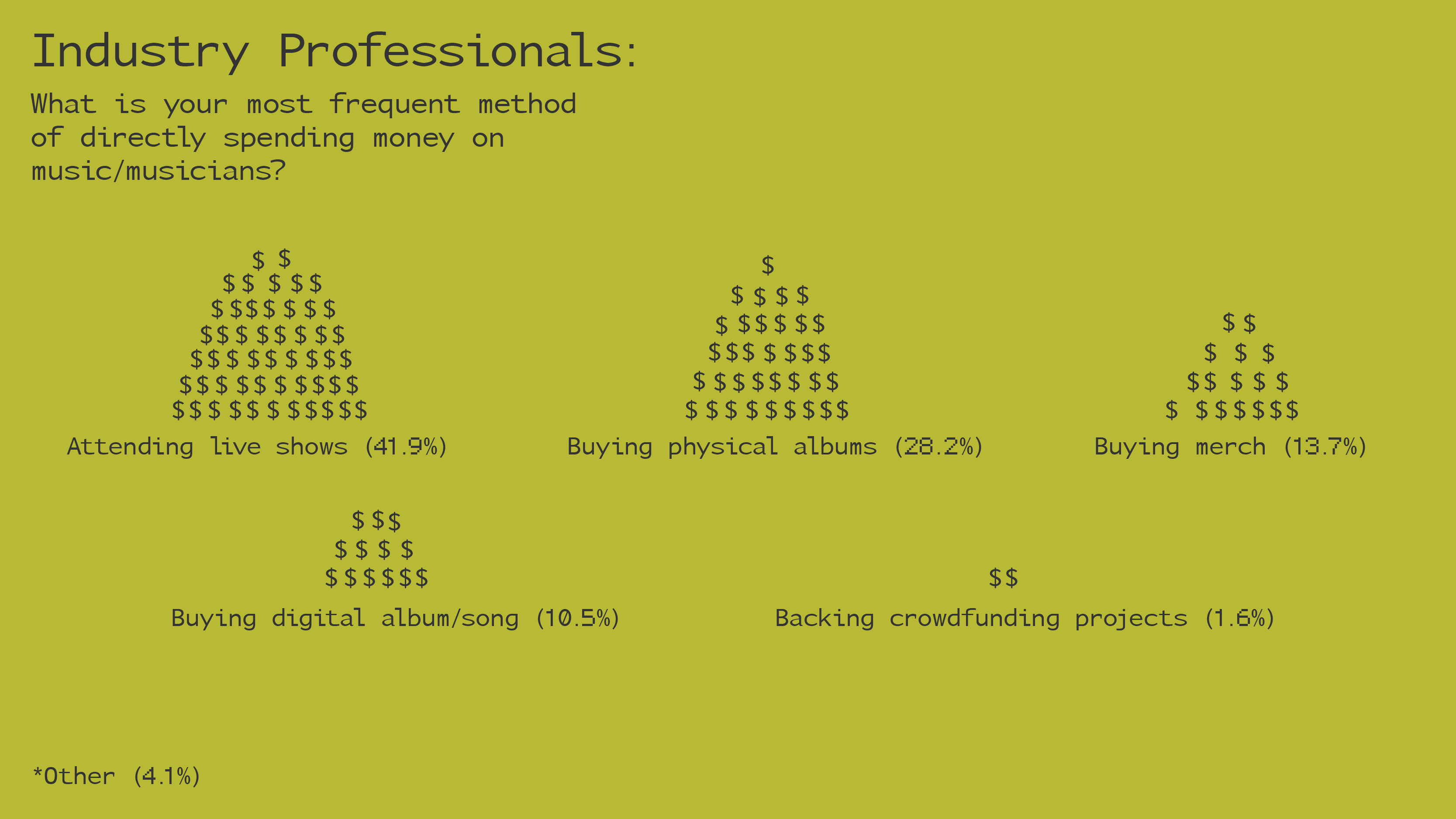
Respondents highlighted the need for diversity in live show bookings, and applauded promoters, festivals, and venues that prioritize inclusivity and adequately compensate performers. Since playing live shows is the best money-maker for musicians—and a key way to access further opportunities—heightened booking diversity could create a positive ripple effect industry-wide.
Data Snapshot:
- 70% of musicians reported that at shows they attended or performed at, less than 25% of performers were people of color.
- 41% of musicians reported that at shows they attended or performed at, less than 25% of performers were cis-women, non-binary, or trans.
- When asked how they preferred to spend money on music/musicians, the highest percentage (42%) of industry professionals said “attending live shows.”
Respondent Insights:
“I've seen concrete smaller-scale effects in my own scene when bookers commit to more diverse lineups, and can see a straightforward path to broader change if larger booking agencies, venues, and promoters could commit to similar priorities.”
“Local bookers have a lot of control of the few venues in town. If they were more conscious of booking POC and femme artists, and made more of an effort to promote those shows, it would have a big effect.”
Industry Professionals
What percentage of leadership / executive-level positions in your company / organization are held by cis-women, non-binary, or trans people?
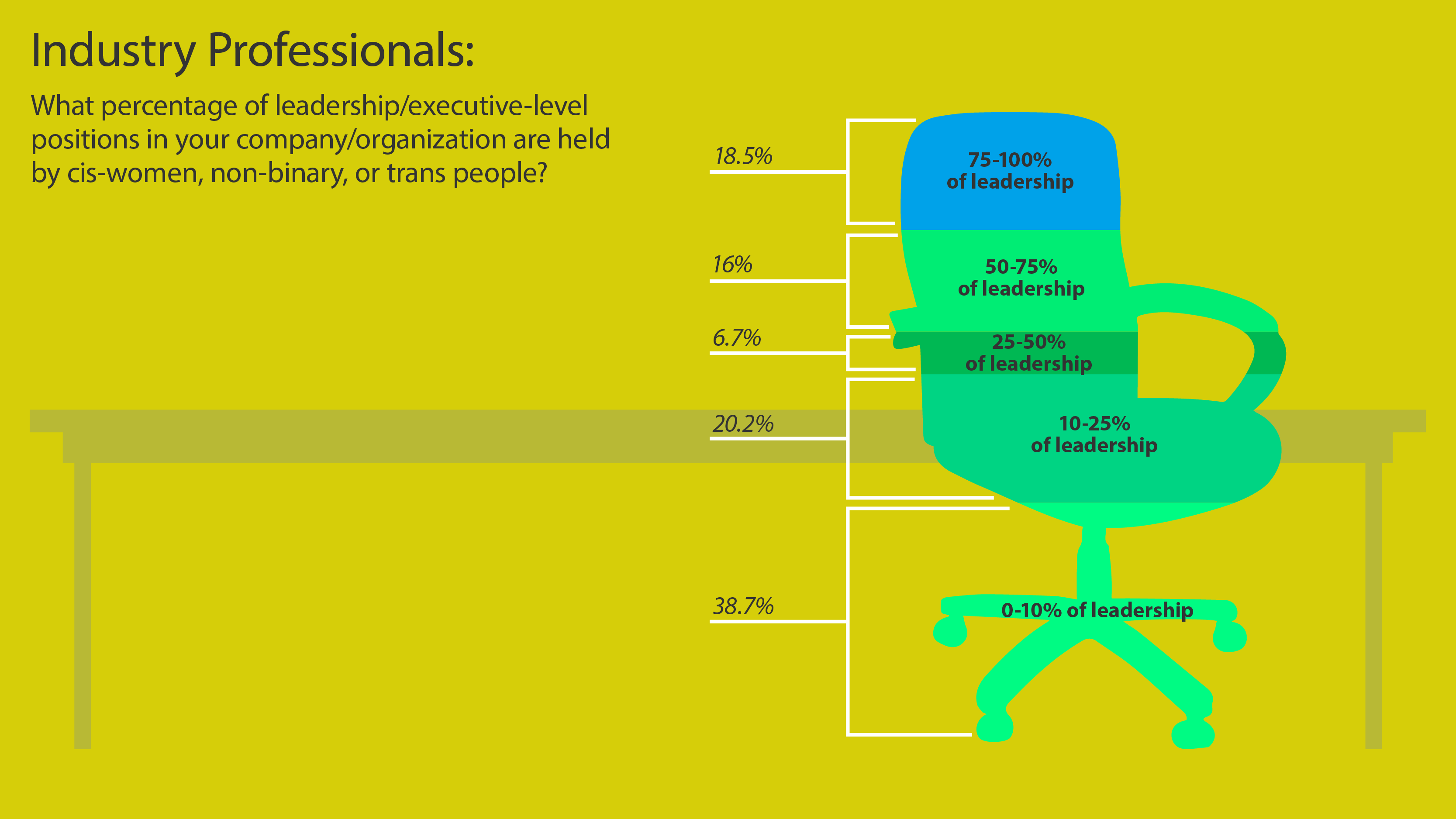
Industry Professionals
What percentage of leadership / executive-level positions in your company / organization are held by people of color?
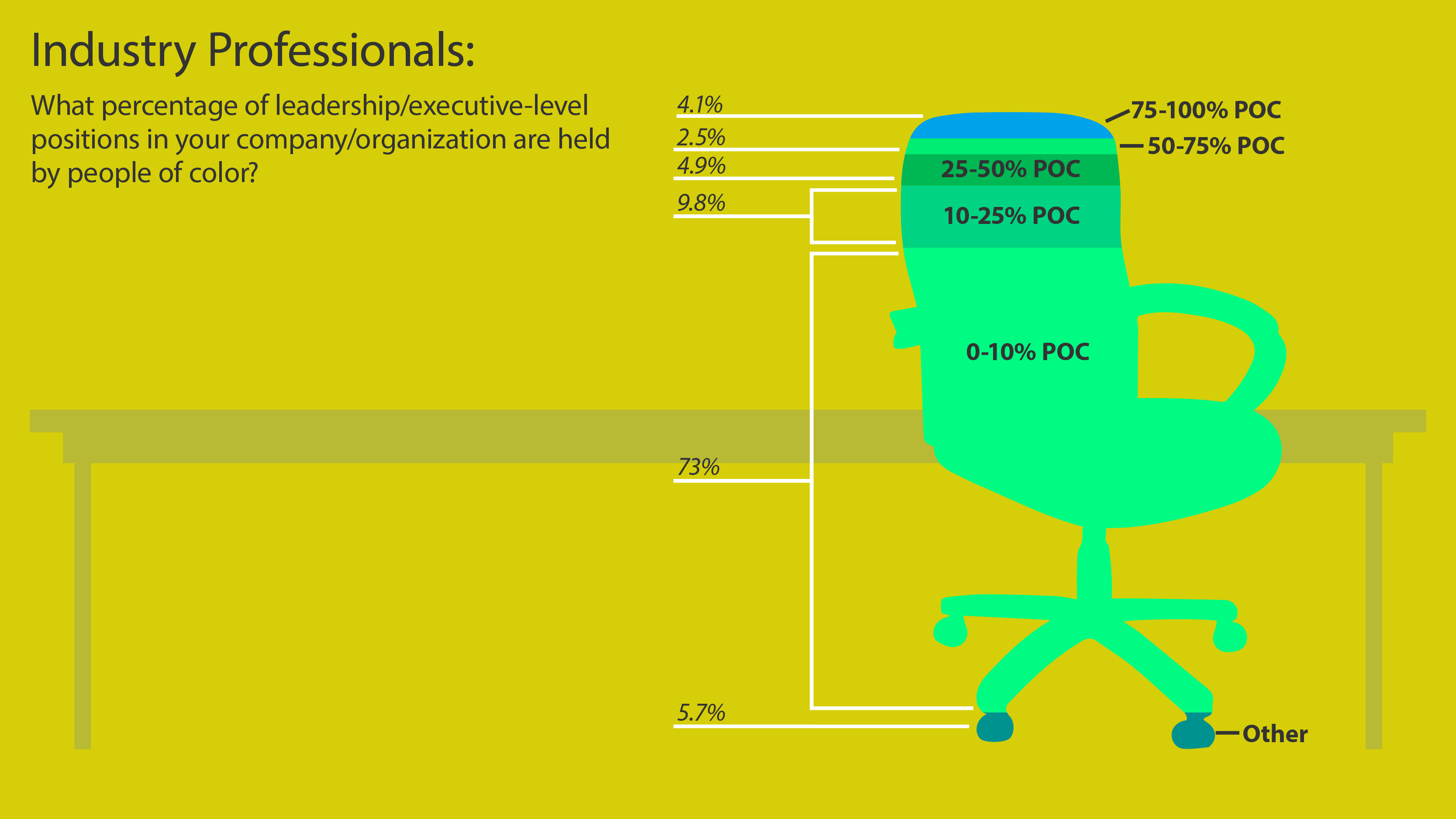
Musicians
On average, what percentage of performing artists at shows you attend (including those at which you perform) are people of color?
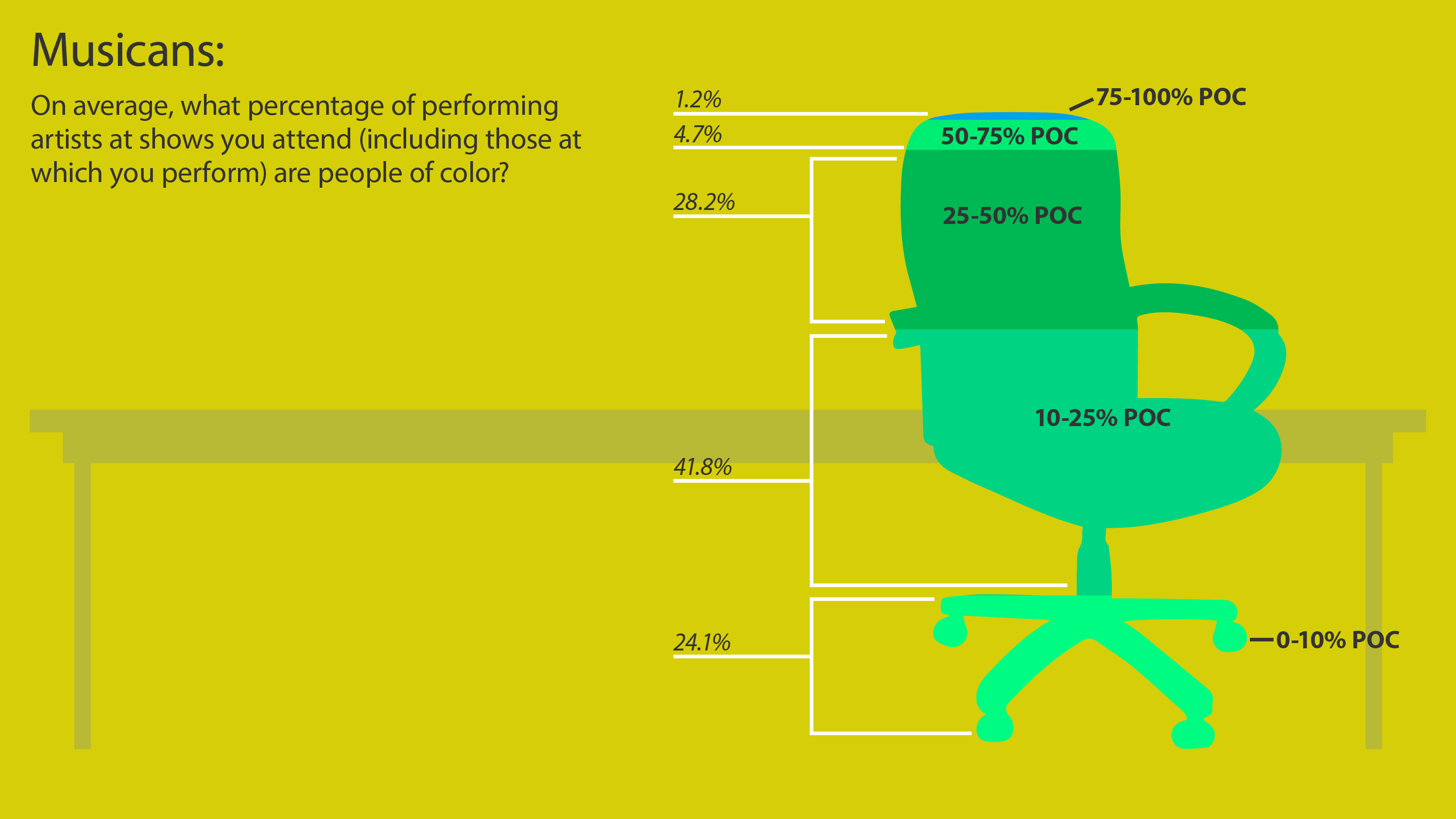
Key finding 06: The music community demands more diversity in industry leadership positions.
While most industry professionals and musicians reported working with a fairly diverse group of colleagues and other performers, industry leadership and gatekeepers do not reflect the music community as a whole—in particular, people of color are underrepresented. This is one of the top barriers to creating a more inclusive industry.
Data Snapshot:
- 83% of industry professionals reported that more than three quarters of their company’s leadership positions were held by white people.
- Nearly 70% of industry professionals reported that more than three quarters of their company’s leadership positions were held by cisgender men.
Respondent Insights:
“Placing those who have been marginalized by discrimination in leadership positions creates a trickle-down effect where they hire, book, and work with artists and arts workers who will not uphold the standard of discrimination and will actively create change.”
“We talk about equality with the goal of more women and POC in positions of power, but we forget to talk about how that would mean men stepping down from their positions of power. While this is perhaps an unrealistic ask, we're at an interesting intersection where we can at least ask for men to listen and be accountable.”
Key finding 07: The music community demands higher standards of professionalism.
Industry Professionals
What are your organization/collective’s greatest barriers or challenges for being a more diverse and inclusive environment? (Choose up to 3)
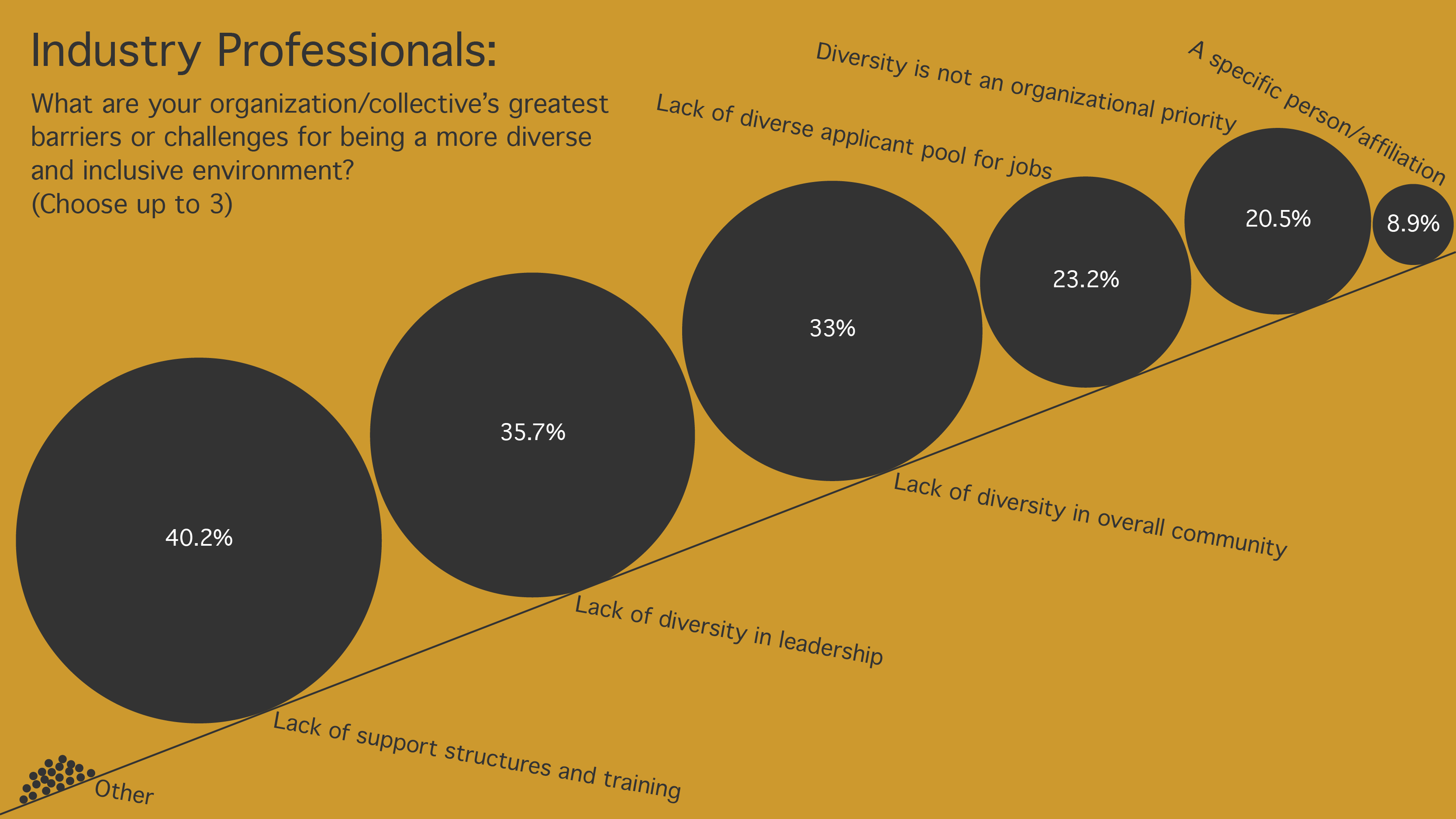
Industry professionals highlighted the need for policies and practices that foreground inclusivity, safety, fairness, and transparency. For this to happen, organizations must consider the frameworks by which they foster an inclusive and equitable environment. This includes enacting discrimination and sexual harassment policies—which, when in place, are highly effective—and investing in diversity and inclusion training.
Data Snapshot:
- The highest percentage (40%) of industry professionals said that “lack of support structures and training” was one of the top barriers to creating a more diverse and inclusive environment within their organization.
- Less than half of industry professionals reported that their organization had a protocol in place for sexual harassment, but when there was a protocol in place, 88% said that it was followed.
- Just 44% of industry professionals reported that their organization had a protocol in place for discrimination, but when there was a protocol in place, 85% said that it was followed.
Respondent Insights:
“I would love to see the music industry operate under healthier standards of workplace boundaries. The area between friends and colleagues gets so blurry, it fuels failures like nepotism and sexual harassment.”
“We need better education frameworks to teach the next generation of musicians what kind of behaviours (sexism, abuse, racism, etc) are not acceptable, and a support network powerful enough to protect self-employed musicians at the start of their career from that kind of abuse.”
Key finding 08: The music industry is (still) controlled by a gatekeeper class.
Musicians
What sector of the music industry has most helped you to grow your career as a musician?
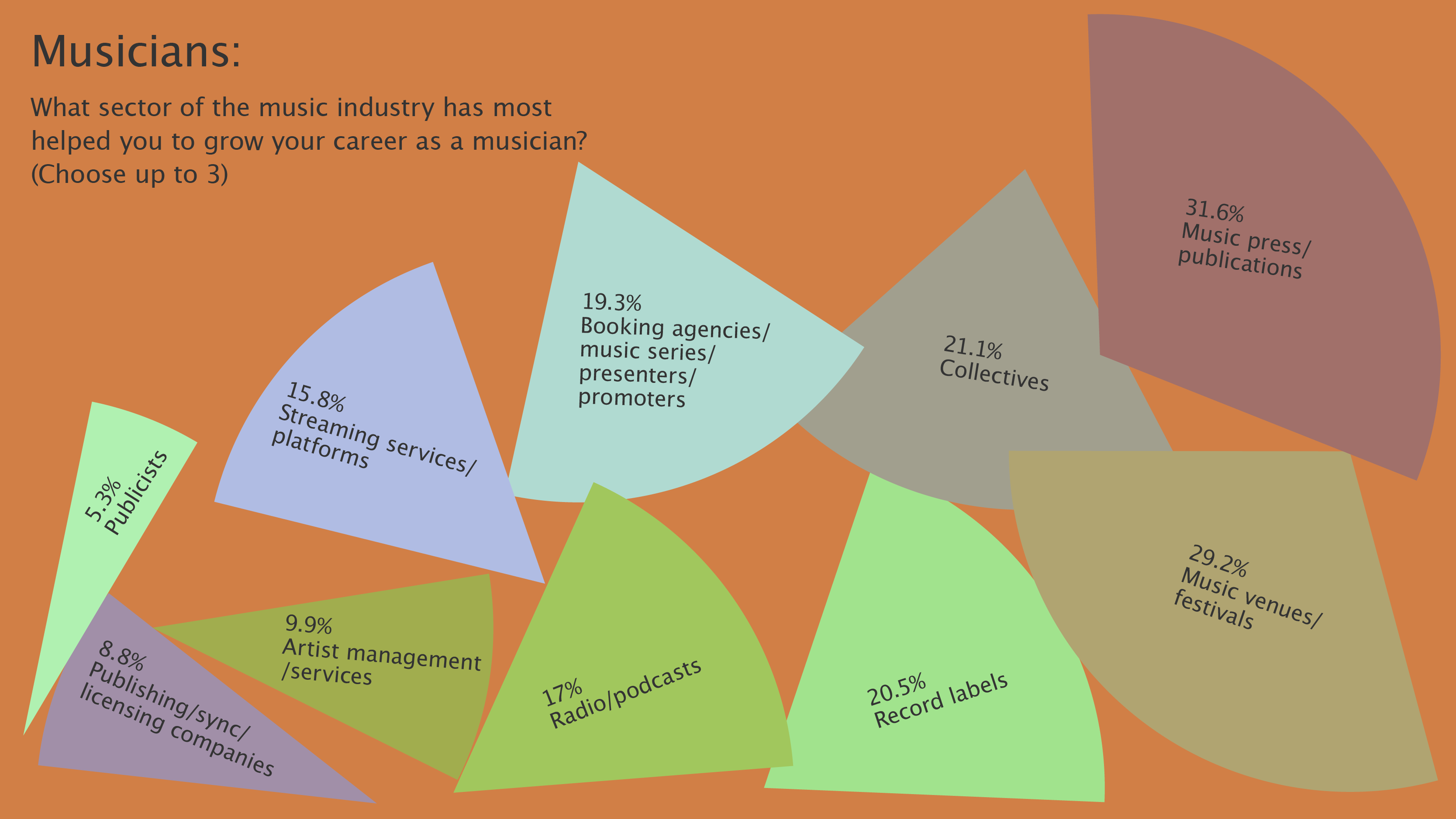
Although digital platforms have enabled musicians to take the distribution of their work into their own hands, gatekeepers—such as press, bookers, and labels—still play a leading role in the growth of an artist’s career. Because of this, music writers, bookers, promoters, and publishers have a responsibility to be accountable for who they give opportunities to, and why. This includes remodeling behavior to avoid back-room deals and nepotism.
Data Snapshot:
- When asked if any particular sectors of the industry had most helped grow their career, the highest percentage (32%) of musicians responded “press/publications.” 29% said “music venues/festivals.”
- When asked what had most helped them to gain traction in the music industry, 29% of musicians said “having an in.”
- 35% of industry professionals and 27% of musicians reported that one of their greatest challenges in pursuing a rewarding career in the music industry was “nepotism/ unfair gatekeeper culture.”
Respondent Insights:
“Music press is the most prevalent gatekeeper in music. Only those who can afford a publicist get access to certain press opportunities, and even once they get them the same tired and boring articles get written over and over about the ‘buzz bands’ with the most hype, as opposed to interesting and new artists that readers may have never heard of otherwise.”
“Everybody has to do their homework and discover new talents. Do not rely on the latest press attention and other lineups—curate your own thing!”
Key finding 09: Personal connections and a supportive social circle are critical in sustaining a career as a musician.
Musicians
When you’ve felt stuck or confused in navigating the music industry, where have you had the most success in finding help/guidance? (Choose up to 3)
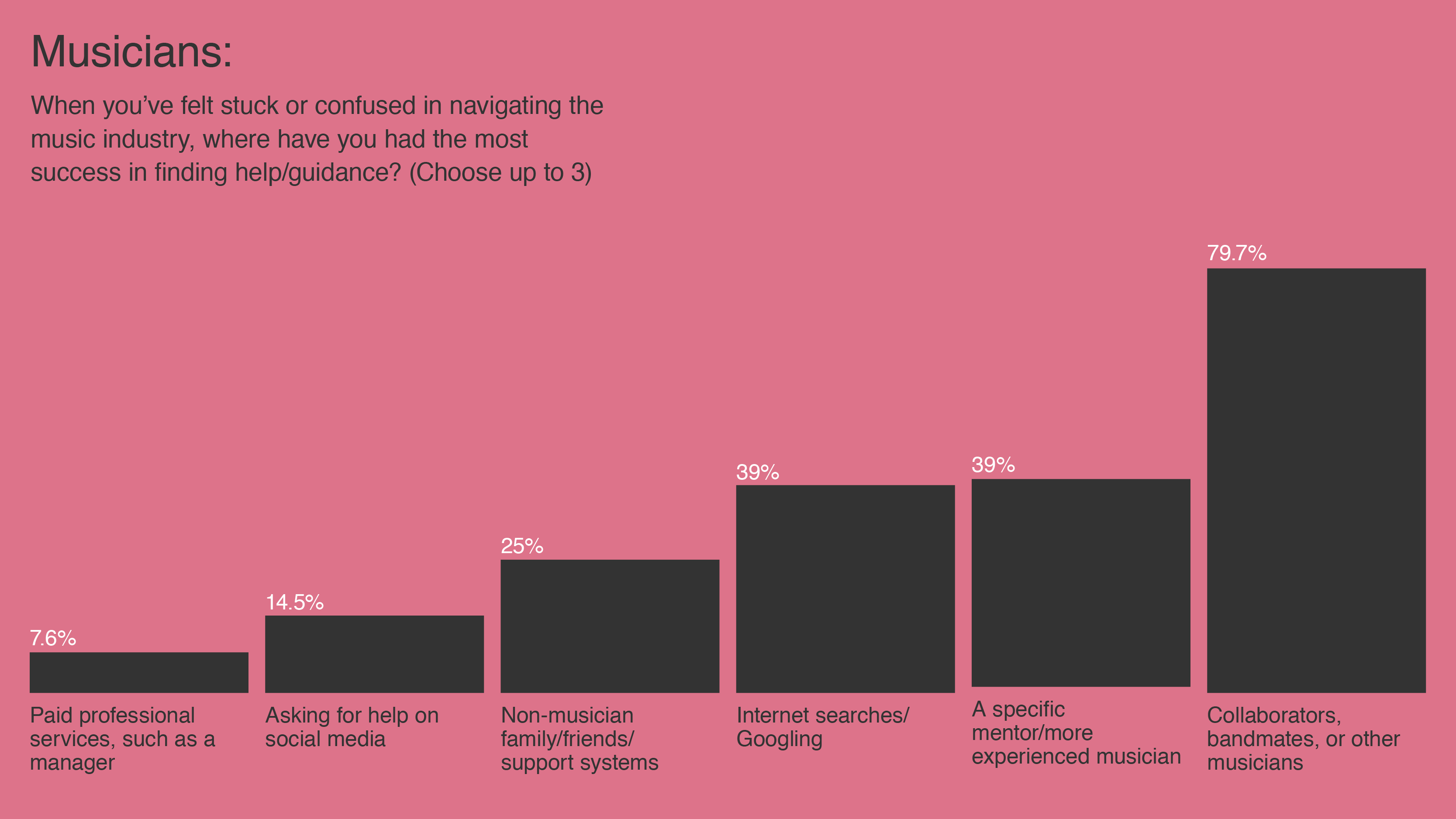
Having a supportive group of peers is one of the key ways musicians are able to gain traction and find guidance as they build their careers. Relationships with mentors, collaborators, band mates, and friends are often how musicians find opportunities; however, it’s yet another place where nepotism creeps in. Opening access to mentorship opportunities and other types of industry relationships would directly help to level the playing field.
Data Snapshot:
- When asked how they found help in navigating the music industry, the vast majority (80%) of musicians responded that their collaborators, bandmates, and other musicians had been a key source of guidance.
- 40% said a specific mentor or more experienced musician was one of the most helpful sources for guidance.
Respondent Insights:
“A directory or easy way of finding a local mentor would greatly help. [I’d like to find] someone who’s done what I’d like to do, who is willing to share advice one-on-one and provide guidance regularly.”
“There need to be more ways for artists and industry professionals from different camps to come together and collaborate across social and sonic lines. Being an artist can be an extremely isolating experience and I understand the impulse to want to 'find your tribe' in music. However, there seems to be an increase in impenetrable musical cliques. This kind of competitive, tribal behavior will not serve to improve conditions. If we had better methods for bridging those gaps, then diversity would increase sonically and socially.”
Key finding 10: A better future music industry will be built through collective community organizing.
Musicians
Overall, what has been the most helpful to you in gaining traction in the music industry? (Choose up to 3)
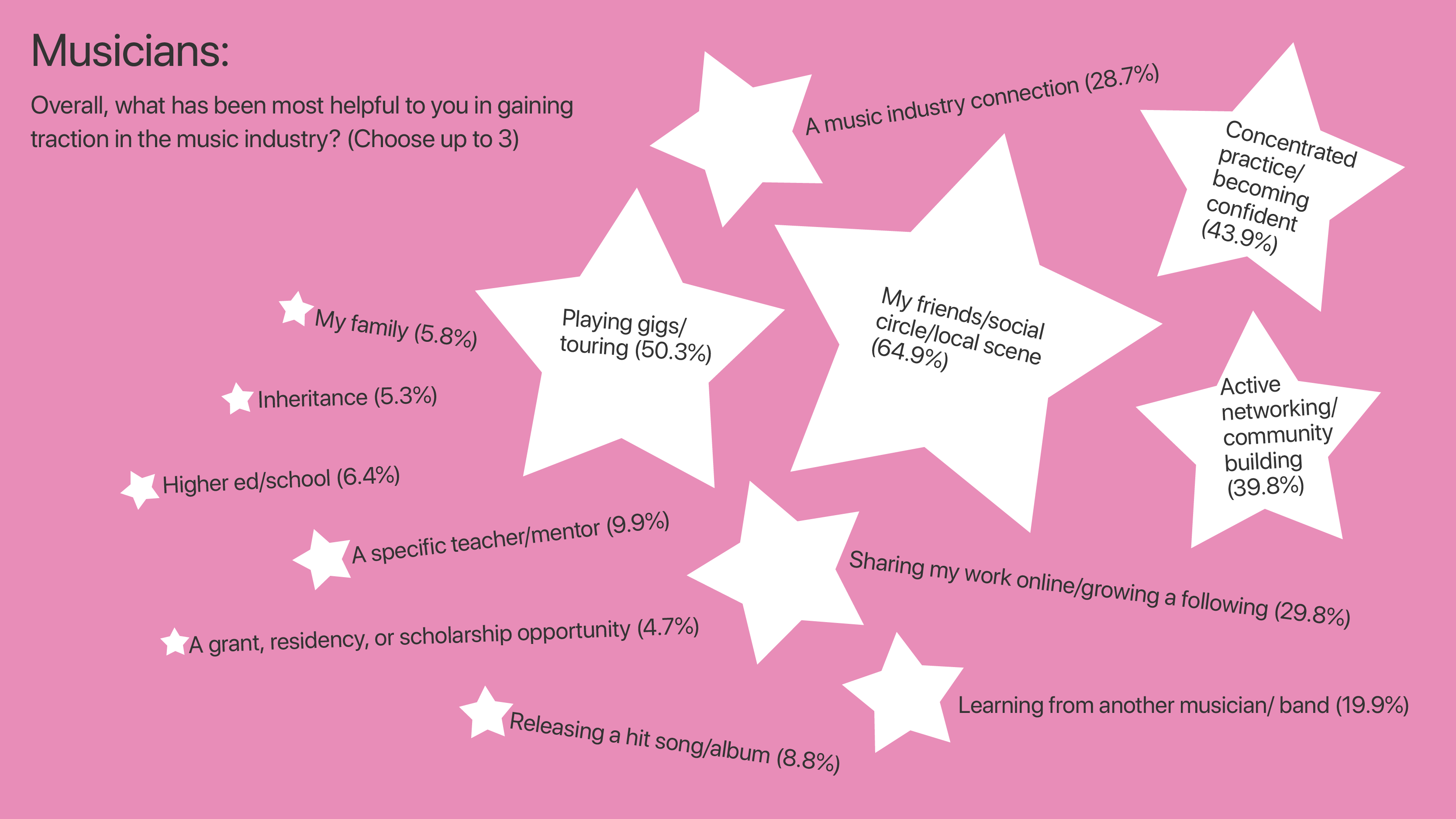
Across the board, survey respondents recognized that the best way to change the industry as a whole is through collective action, often on a local scale. In write-in responses in particular, musicians championed the potential of collectives, local scenes, and more collaborative efforts to promote fair pay, diversity, and equity across the industry.
Data Snapshot:
- When asked what had most helped them gain traction in the music industry, the largest percentage of musicians (65%) said their friends, social circle, or local scene had most helped them.
- When asked if any part of the music industry had most helped in growing their career, 21% responded with “collectives.”
Respondent Insights:
“Collectives enable people to manifest their own heterotopias and bring them into the world! By creating their own rules and leading by example, collectives have forced changes to venues, festivals, legislation, and culture overall rather than waiting for change to happen top down.”
“The most encouraging thing I’ve seen in the music industry lately is passionate people with the will to build and support local DIY scenes and create space in their community for all voices, in spite of limited financial resources.”
“All musicians should unionize in order to squeeze more money out of streaming services.”
In Conclusion...
As the data clearly shows, the music industry faces significant challenges that must be addressed head-on in order to build a better future. While this will be hard work, respondents conveyed a sense of optimism that momentum is building around solving these problems.
In our last question to survey respondents, we asked them to share the most encouraging things they’d seen happening in today’s industry. In closing, we’d like to share a few responses that shout out the people, organizations, and projects that are paving the way for a more equitable, inclusive, and sustainable music industry.
This report was co-authored by Willa Köerner and René Kladzyk, designed by Molly Grund, and built by Elliott Cost.